|
De Amerikaanse schrijver John Green werd geboren in Indianapolis, Indiana, op 24 augustus 1977. Zie ook alle tags voor John Green op dit blog.
Uit: Turtles All The Way Down
“At the time I first realized I might be fictional, my weekdays were spent at a publicly funded institution on the north side of Indianapolis called White River High School, where I was required to eat lunch at a particular time—between 12:37 P.M. and 1:14 P.M.—by forces so much larger than myself that I couldn't even begin to identify them. If those forces had given me a different lunch period, or if the tablemates who helped author my fate had chosen a different topic of conversation that September day, I would've met a different end—or at least a different middle. But I was beginning to learn that your life is a story told about you, not one that you tell.
Of course, you pretend to be the author. You have to. You think, I now choose to go to lunch, when that monotone beep rings from on high at 12:37. But really, the bell decides. You think you're the painter, but you're the canvas.
Hundreds of voices were shouting over one another in the cafeteria, so that the conversation became mere sound, the rushing of a river over rocks. And as I sat beneath fluorescent cylinders spewing aggressively artificial light, I thought about how we all believed ourselves to be the hero of some personal epic, when in fact we were basically identical organisms colonizing a vast and windowless room that smelled of Lysol and lard.
I was eating a peanut butter and honey sandwich and drinking a Dr Pepper. To be honest, I find the whole process of masticating plants and animals and then shoving them down my esophagus kind of disgusting, so I was trying not to think about the fact that I was eating, which is a form of thinking about it.
Across the table from me, Mychal Turner was scribbling in a yellow-paper notebook. Our lunch table was like a long running play on Broadway: The cast changed over the years, but the roles never did. Mychal was The Artsy One. He was talking with Daisy Ramirez, who'd played the role of my Best and Most Fearless Friend since elementary school, but I couldn't follow their conversation over the noise of all the others.
What was my part in this play? The Sidekick. I was Daisy's Friend, or Ms. Holmes's Daughter. I was somebody's something.
I felt my stomach begin to work on the sandwich, and even over everybody's talking, I could hear it digesting, all the bacteria chewing the slime of peanut butter-the students inside of me eating at my internal cafeteria. A shiver con vulsed through me.“
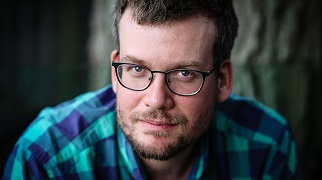
John Green (Indianapolis, 24 augustus 1977)
De Nederlands-Zwitserse schrijver, tekstschrijver, componist, zanger en pianist Drs. P (eig. Heinz Hermann Polzer) werd geboren in het Zwitserse Thun op 24 augustus 1919. Zie ook alle tags voor Drs. P op dit blog.
Venus van Milo
Het schrijnt mij van mijn hart tot in mijn d
Ze is zo koud, en toch zo lief, zo licht
En haar gebrek vervult mij met erb
Och, kon ik haar slechts troosten en verw
Al was het met een incompleet gedicht.
Telescoop
Dit maal komt telescooprijm aan bod
Een bij 't zien al te snappen methode
Om de tijd die u zwaar valt te doden
Doe dit niet met breedvoerige oden -
Volg de nieuwe verskunstige mode
Vindt u dit nog te moeilijk? Mijn God!
Men maakt zich boos op die neutronenbom
In Nederland, in 't Kremlin, zelfs in Rome...
Zijn oorlogswapens, door de bank genomen
Dan iets waarbij je lekker weg kunt dromen?
Dus met of zonder - kome maar wat kome
En 't komt er geen seconde later om.
Voor dichters ga ik zelden plat
Tentije, J.J.L. ten Kate
En nog een aantal kan ik haten
Of minstens ongelezen laten
Maar ik waardeer in hoge mate
Light verse, mits goed - als in dit blad.
Streekroman
‘Marie trekt naar de stad en wordt frivool.
Boer Teunis stopt de kousen, zorgt voor pap.
De achterlijke Wobbe groeit als kool’.
Hij maakt een paard nerveus en krijgt een trap.
Zijn toekomst oogde toch al niet zo best
En nu ontgaat hem ook het vaderschap.
Boer Teunis sterft. Het vee krijgt runderpest
En Wobbe kan het niet meer aan. Maar dan...
Marie (nog mooi) terug in 't oude nest!
‘Een nieuwe ramp! De vlam slaat in de pan!
Wat is hij flink, die jonge brandweerman.’
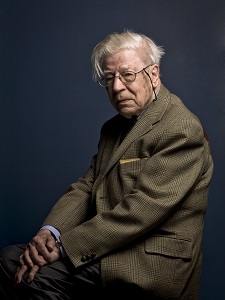
Drs. P (24 augustus 1919 – 13 juni 2015)
De Nederlandse dichteres en schrijfster Marion Bloem werd op 24 augustus 1952 geboren in Arnhem. Zie ook alle tags voor Marion Bloem op dit blog.
Uit: Haar goede hand
“Over mijn moeder heb ik veel geschreven.
Of eigenlijk dat ook weer niet. Ik heb telkens iets van haar geleend en het gehavend teruggegeven. Ze heeft daarover nooit geklaagd, terwijl het niet gepast is om van iemands trouwservies ongevraagd de theepot, een ontbijtbord, botervloot of schoteltje uit de kast te nemen, die te gebruiken en niet netjes te retourneren, maar maanden, jaren later in scherven, of op een verkeerde manier gelijmd, in een etalage te presenteren met de trotse woorden: ‘Kijk eens wat ik heb gemaakt! Je mag er net zo vaak naar kijken als je wilt.’
Ze vragen haar vaak: ‘Ben je niet trots op je dochter, die schrijfster?’
Meestal antwoordt ze: ‘Ik ben trots op alle vier mijn kinderen, op het ene niet meer dan op het andere, ze zijn allemaal gelijk.’
Mijn moeder durft wat ze werkelijk vindt niet hardop te zeggen. Misschien zelfs niet te denken. Daarom zeg ik het voor haar: het is geen benijdenswaardig lot om moeder van een auteur te zijn die zich permitteert jouw verleden, heden en toekomst als hutspot op te dienen en daarbij verwacht dat je de portie gretig consumeert, en vervolgens beweert dat het heus goed heeft gesmaakt.
Ze is kleurrijker dan ik zwart-op-wit kan beschrijven. Ze is complexer dan een leesbaar boek tolereert en ze is dapperder dan ik in zinnen kan uitdrukken.
Mijn broers en zus adviseer ik dit boek niet te lezen, tenzij met het besef dat hun moeder de mijne niet is en de mijne niet de vrouw is van mijn zeven jaar geleden overleden vader, noch de dame over wie haar buurvrouw de laatste jaren telkens klaagt: ‘Ze gaat wel vreselijk achteruit. Ze is vaak erg verward. Ze zou niet meer op zichzelf moeten wonen, het wordt levensgevaarlijk, weet je dat.”
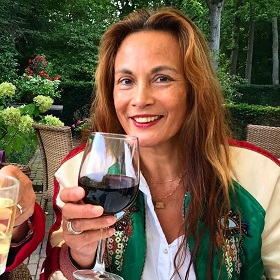
Marion Bloem (Arnhem, 24 augustus 1952)
De Nederlandse schrijver en rapper Pepijn Lanen werd geboren in Utrecht op 4 augustus 1982. Zie ook alle tags voor Pepijn Lanen op dit blog.
Uit: Sjeumig
“Druppels uitgezwete alcohol dansten via zijn voorhoofd, wangen en nek zijn kraag in. Eerder al had hij zijn laptop geopend, de vingers gekruist dat de e-mail met de bevestiging van de desbetreffende afspraak nog openstond. Gelukkig kwam hij er juist op dat moment achter dat de accu helemaal leeg was geraakt. De chauffeur stuurde de elektrische mobiel nog maar een hoek om en keek in de achteruitkijkspiegel naar een zwetende jongeman met een rood hoofd die zijn blik ontweek.
Via de navigatie van zijn telefoon probeerde hij het adres te lokaliseren, aangezien de chauffeur steeds desgevraagd op zijn Tom- Tom-kastje tikte met een harige dikke vinger en vervolgens ‘nee’ schudde, waarna er soms een paar huidschilfers op zijn schouders belandden. Elke hap adem die hij nam voelde als een ingeslikt stuk ziekte. De chauffeur was buiten de auto de straat op gegaan om een paar lokaaltjes aan de tand te voelen over het nu bijna mythische adres van zijn bestemming. Vanaf zijn zitplaats op de achterbank zag hij mensen met hun hoofd schudden en de chauffeur met één hand in zijn zij en de andere aan zijn achterhoofd krabben. ‘Het leven is een gekke poppenkast’ stond op een sticker op het dashboard. De navigatie van zijn telefoon gaf aan a) dat zij geen flauw idee had waar in vredesnaam om gevraagd werd en b) dat het helemaal geen zin had om het uit te gaan zoeken omdat er precies bijna niks aan ontvangst mogelijk was. Het ding eindigde zijn monoloog met ‘O ja, ik ben helemaal leeg’ in de vorm van een abrupt zwart geworden scherm.
Honderdtweeënzestig euro en vijfenzeventig cent stond er op de teller, en de chauffeur was er onderhand klaar mee. Niet alleen voelde het meer en meer alsof de opgegeven locatie niet bestond, hij begon ook te twijfelen aan de mogelijkheid of zijn passagier überhaupt wel beschikte over de liquide middelen om hem te compenseren voor het ritje.
De chauffeur had vriendelijk doch onvriendelijk aangegeven niet langer de Robin bij zijn Batman dan wel de Jeeves bij zijn Wooster te willen zijn. De chauffeur stelde daarom ook voor dat er afgerekend werd en eenieder zijn eigen weg zou vervolgen. Toen hij aangaf dat hij moest pinnen om het verschuldigde bedrag in te kunnen lossen kreeg de chauffeur bijna een rolberoerte.”
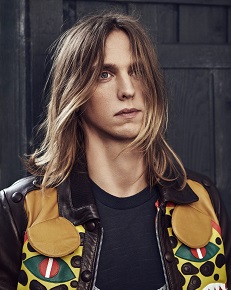
Pepijn Lanen (Utrecht, 4 augustus 1982)
De Engelse komiek, schrijver, acteur en presentator Stephen John Fry werd geboren in Londen op 24 augustus 1957. Zie ook alle tags voor Stephen Fry op dit blog.
Uit: Mythos
“These days the origin of the universe is explained by proposing a Big Bang, a single event that instantly brought into being all the matter from which everything and everyone are made.
The ancient Greeks had a different idea. They said that it all started not with a bang, but with CHAOS.
Was Chaos a god – a divine being – or simply a state of nothingness? Or was Chaos, just as we would use the word today, a kind of terrible mess, like a teenager’s bedroom only worse?
Think of Chaos perhaps as a kind of grand cosmic yawn. As in a yawning chasm or a yawning void.
Whether Chaos brought life and substance out of nothing or whether Chaos yawned life up or dreamed it up, or conjured it up in some other way I don’t know. I wasn’t there. Nor were you. And yet in a way we were, because all the bits that make us were there. It is enough to say that the Greeks thought it was Chaos who, with a massive heave, or a great shrug, or hiccup, vomit or cough, began the long chain of creation that has ended with pelicans and penicillin and toadstools and toads, sea-lions, seals, lions, human beings and daffodils and murder and art and love and confusion and death and madness and biscuits.
Whatever the truth, science today agrees that everything is destined to return to Chaos. It calls this inevitable fate entropy: part of the great cycle from Chaos to order and back again to Chaos. Your trousers began as chaotic atoms that somehow coalesced into matter that ordered itself over aeons into a living substance that slowly evolved into a cotton plant that was woven into the handsome stuff that sheathes your lovely legs. In time you will abandon your trousers – not now, I hope – and they will rot down in a landfill or be burned. In either case their matter will at length be set free to become part of the atmosphere of the planet. And when the sun explodes and takes every particle of this world with it, including the ingredients of your trousers, all the constituent atoms will return to cold Chaos. And what is true for your trousers is of course true for you.
So the Chaos that began everything is also the Chaos that will end everything.
Now, you might be the kind of person who asks, ‘But who or what was there before Chaos?’ or ‘Who or what was there before the Big Bang? There must have been something.”
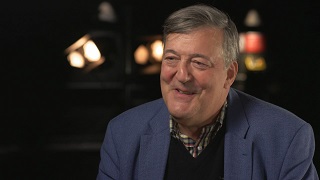
Stephen Fry (Londen, 24 augustus 1957)
De Schotse schrijfster en journaliste Ali Smith werd geboren op 24 augustus 1962 in Inverness. Zie ook alle tags voor Ali Smith op dit blog.
Uit: Autumn
It was the worst of times, it was the worst of times. Again. That’s the thing about things. They fall apart, always have, always will, it’s in their nature. So an old old man washes up on a shore. He looks like a punctured football with its stitching split, the leather kind that people kicked a hundred years ago. The sea’s been rough. It has taken the shirt off his back; naked as the day I was born are the words in the head he moves on its neck, but it hurts to. So try not to move the head. What’s this in his mouth, grit? it’s sand, it’s under his tongue, he can feel it, he can hear it grinding when his teeth move against each other, singing its sand-song: I’m ground so small, but in the end I’m all, I’m softer if I’m underneath you when you fall, in sun I glitter, wind heaps me over litter, put a message in a bottle, throw the bottle in the sea, the bottle’s made of me, I’m the hardest grain to harvest, to harvest…
the words for the song trickle away. He is tired. The sand in his mouth and his eyes is the last of the grains in the neck of the sandglass.
Daniel Gluck, your luck’s run out at last.
He prises open one stuck eye. But –
Daniel sits up on the sand and the stones – is this it? really? this? is death?
He shades his eyes. Very bright.
Sunlit. Terribly cold, though.
He is on a sandy stony strand, the wind distinctly harsh, the sun out, yes, but no heat off it. Naked, too. No wonder he’s cold. He looks down and sees that his body’s still the old body, the ruined knees.
He’d imagined death would distil a person, strip the rotting rot away till everything was light as a cloud.
Seems the self you get left with on the shore, in the end, is the self that you were when you went.
If I’d known, Daniel thinks, I’d have made sure to go at twenty, twenty five.
Only the good.
Or perhaps (he thinks, one hand shielding his face so if anyone can see him no one will be offended by him picking out what’s in the lining of his nose, or giving it a look to see what it is – it’s sand, beautiful the detail, the different array of colours of even the pulverized world, then he rubs it away off his fingertips) this is my self distilled. If so then death’s a sorry disappointment.
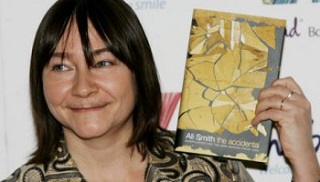
Ali Smith (Inverness, 24 augustus 1962)
De Argentijnse schrijver Jorge Luis Borges werd geboren op 24 augustus 1899 in Buenos Aires. Zie ook alle tags voor Jorge Luis Borges op dit blog.
Calle Piedras en calle Chile
Door deze straten liep ik vele dagen.
Ik herinner me ze niet. Niet dichterbij
dan de uitheemse Ganges lijken mij
die ochtenden en avonden. Ze schragen
me niet langer. Ze zijn gedweeë klei
van mijn verleden, door de tijd verteerd
of door de kunsten gemanipuleerd
en niet ontcijferd door wichelarij.
Misschien dat er een zwaard in het duister was,
wellicht groeide daar ook een roos. Vervlochten
schimmen verzamelen hen in hun krochten.
Niets. Het enige dat mij nog rest is as.
Wanneer ik van mijn maskers ben bevrijd
ben ik in de dood alleen vergetelheid.
Vertaald door Barber van de Pol en Maarten Steenmeijer
A Patio
At evening
they grow weary, the patio's two or three colours.
Tonight, the moon, bright circle,
fails to dominate space.
Patio, channel of sky.
The patio is the slope
down which sky flows into the house.
Serene,
eternity waits at the crossroad of stars.
It's pleasant to live in the friendly dark
of entrance-way, arbour, and cistern.
Vertaald door A. S. Kline
Rain
The afternoon has brightened up at last
For rain is falling, sudden and minute.
Falling or fallen. There is no dispute:
Rain is a thing that happens in the past.
Who hears it fall retrieves a time that fled
When an uncanny windfall could disclose
To him a flower by the name of rose
And the perplexing redness of its red.
Falling until it blinds each windowpane,
Within a suburb now long lost this rain
Shall liven black grapes on a vine inside
A certain patio that is no more.
A long-awaited voice through the downpour
Is from my father. He has never died.
Vertaald door A.Z. Foreman
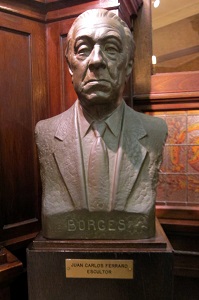
Jorge Luis Borges (24 augustus 1899 – 14 juni 1986)
Borstbeeld in Buenos Aires
De Nederlandse schrijver Johan Johannes Fabricius werd op 24 augustus 1899 in Bandoeng in Nederlands-Indië geboren. Zie ook alle tags voor Johan Fabricius op dit blog.
Uit: De scheepsjongens van Bontekoe
“Blok trok een ernstig gezicht, spoog zo er eens voor zich heen en mat met zijn ogen de grond af. ‘Zie je dat paaltje, helemaal daarginds?’
‘Dat daar?’
‘Nee, nog eentje verder. Zo lang is-t-ie vast wel van 't galjoen tot aan de spiegel.’
En de schipper ging met zijn beide zoons de zeilen inrollen.
Padde had er zwijgend bij staan luisteren, pakte nu zijn emmertje weer op, en de beide jongens vervolgden hun weg. ‘Die sprong in de tjalk viel niet mee!’ zei Padde. ‘'t Was een heel eind!’
Maar Hajo gaf geen antwoord.
Zo kwamen de jongens op de Italiaanse zeedijk. Er lag een brede strook ijs.
Plotseling bleef Hajo stilstaan. Padde schoot gedachteloos nog een eindje door. Toen hield hij stil en keek verbaasd om. De blik in Hajo's ogen duidde op onweer.
‘Kijk eens, Padde,’ zei Hajo langzaam en wees voor zich uit. ‘Wat zie je daar op het ijs?’
‘Hemeltje!’ zei Padde, ‘daar is er een aan het botkloppen.’
‘Juist! Er is er een in mijn bijt aan het botkloppen. Ken jij hem? Ik niet.’
Padde begon opgewonden te blazen. ‘In onze bijt! Nee, wie het is, kan ik niet zien. Ik zie niet zo goed als jij.’ En Paddes ogengeknip onderstreepte deze verklaring.
‘Kom mee,’ beval Hajo.
Padde stelde voor zichzelf vast dat het weer een spannende middag kon worden.
Samen stevenden ze op de roekeloze botklopper af.
Het was een netgeklede jongen, die, een emmertje naast zich, energiek met een bijl op het ijs klopte, om de door de kou verdoofde bot te wekken en naar de bijt te lokken waarin het verraderlijke net hing. De jongen was zo in zijn werk verdiept, dat hij niet merkte wat hem boven het hoofd hing.
Padde kon zijn verontwaardiging niet langer verkroppen: toen ze de dijk afgingen, rende hij op de ijverige klopper toe. Maar vlak bij hem gekomen, had hij het ongeluk uit te glijden; hij plofte achterover op het ijs - dat weinig meegaf! - en kwam verbouwereerd overeind.”
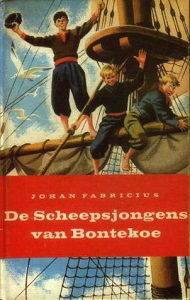
Johan Fabricius (24 augustus 1899 – 21 juni 1981)
Cover
De Engelse dichter en priester Robert Herrick werd geboren in Londen en gedoopt op 24 augustus 1591. Zie ook alle tags voor Robert Herrick op dit blog.
To Electra
I dare not ask a kiss,
I dare not beg a smile,
Lest having this, or that,
Will make me proud the while.
No, no the utmost share,
Of my heart’s desire be,
Only to kiss that air,
That lately kissed thee
Another Grace for a Child
Here a little child I stand
Heaving up my either hand;
Cold as paddocks though they be,
Here I lift them up to Thee,
For a benison to fall
On our meat, and on us all. Amen.
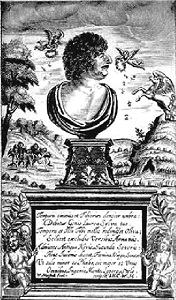
Robert Herrick (24 augustus 1591 – 15 oktober 1674)
Portret op een titelblad uit 1648
Zie voor nog meer schrijvers van de 24e augustus ook mijn blog van 24 augustus 2017 en ook mijn blog van 24 augustus 2014 deel 2.
|



